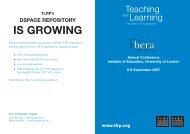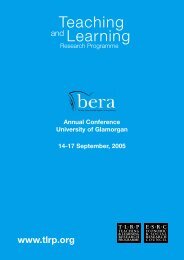Teachers - Teaching and Learning Research Programme
Teachers - Teaching and Learning Research Programme
Teachers - Teaching and Learning Research Programme
Create successful ePaper yourself
Turn your PDF publications into a flip-book with our unique Google optimized e-Paper software.
14<br />
important for teachers to have knowledge of the reform’s first principles, if change is to<br />
be sustained once the ‘special project’ status ends. Such knowledge is important because<br />
it enables teachers to respond to subsequent competing pressures or changes in their<br />
environment. In our own work in Transfer, for example, some participating LEAs also<br />
agreed to participate in the DfEE Key Stage 3 Pilot Project because they assumed that<br />
schools could consolidate their efforts on what were seen as overlapping initiatives.<br />
However, the philosophy of the Key Stage 3 pilot involves a highly directed structured<br />
approach, whereas in our transfer project the researcher’s role is to help evaluate the<br />
teachers’ solutions for improving curriculum continuity. Some teachers are finding it<br />
difficult to ‘square the circle’.<br />
The third criterion is ‘a supportive community of practice’. For McLaughlin this is best<br />
achieved through ‘whole school’ involvement. She argues that if teachers engaged in<br />
reform become isolated from colleagues, then what they do takes on the form of an<br />
experiment rather than an authentic experience. They point, as an example, to an ICT<br />
project where the new technology was situated in one or two classrooms causing the<br />
other teachers to feel jealous. McLaughlin also recommends that the key teachers in the<br />
project should be given leadership roles in supporting the reform throughout the school.<br />
This, in turn, highlights the key role of headteachers, who may have various reasons for<br />
taking up reform. It may, for example, provide extra equipment <strong>and</strong> local ‘kudos’, while<br />
it is sometimes seen as a way of revitalising the career of a ‘jaded ‘colleague.<br />
<strong>Research</strong>ers need to anticipate these possibilities <strong>and</strong> build them into the design. Local<br />
Authorities also have a role to play (Fullan 1999: 65). Headteachers will have a hard time<br />
sustaining reform if the philosophy of those in charge of education in their LEA pushes<br />
against it.<br />
This is a fairly obvious point, but the UK situation is more complex because of national<br />
initiatives <strong>and</strong> pressures from bodies such as Ofsted <strong>and</strong> QCA. This can restrict the role<br />
of the LEAs <strong>and</strong> prevent them from offering the kinds of support required. .

















